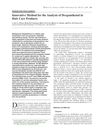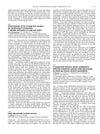 August 2023 in “Journal of Chromatographic Science”
August 2023 in “Journal of Chromatographic Science” A new method accurately measures three compounds in rat plasma from pine needle extracts, aiding future research on its use for hair loss.
12 citations,
May 2017 in “Journal of pharmaceutical and biomedical analysis” The method shows that zinc pyrithione and climbazole from anti-dandruff shampoo effectively reach the scalp.
[object Object]  1 citations,
March 2019 in “Journal of AOAC INTERNATIONAL”
1 citations,
March 2019 in “Journal of AOAC INTERNATIONAL” New method quickly and accurately measures dexpanthenol in hair products.
 December 2024 in “PubMed”
December 2024 in “PubMed” TrichoFoam™ effectively delivers multiple hair loss treatments, maintaining their stability and effectiveness.
12 citations,
August 2022 in “Ecotoxicology and Environmental Safety” A new method accurately detects bisphenols and parabens in human hair.
 November 2022 in “Journal of Investigative Dermatology”
November 2022 in “Journal of Investigative Dermatology” Aging skin cells change their lipid profiles due to stress, affecting skin health.
[object Object] Researchers developed a quick and accurate method to measure hormones in urine, confirming a baldness treatment's effectiveness without altering hormone levels.
 205 citations,
March 2012 in “Science Translational Medicine”
205 citations,
March 2012 in “Science Translational Medicine” PGD2 stops hair growth and is higher in bald men with AGA.
 71 citations,
January 2014 in “Journal of Proteome Research”
71 citations,
January 2014 in “Journal of Proteome Research” Women with PCOS have different levels of certain fats and proteins in their blood, which could help diagnose the condition.
 59 citations,
January 2015 in “Nanoscale”
59 citations,
January 2015 in “Nanoscale” The new micelle formulation delivers acne treatment more effectively and safely than current gels.
 49 citations,
December 2017 in “Journal of pharmaceutical and biomedical analysis”
49 citations,
December 2017 in “Journal of pharmaceutical and biomedical analysis” The method effectively detects banned substances in urine for sports antidoping.
 25 citations,
July 2019 in “Journal of drug delivery science and technology”
25 citations,
July 2019 in “Journal of drug delivery science and technology” Researchers created better skin-application menthol capsules that are stable, safe, and penetrate the skin quickly.
 24 citations,
January 2014 in “The American Journal of Chinese Medicine”
24 citations,
January 2014 in “The American Journal of Chinese Medicine” The leaves of Platycladus orientalis have potential health benefits but require more research for safety and understanding how they work.
 19 citations,
November 2018 in “Nutrients”
19 citations,
November 2018 in “Nutrients” Annurca apple extract may protect mouse hair from damage by chemotherapy and could help treat hair loss without promoting cancer growth.
 18 citations,
October 2018 in “Nutrients”
18 citations,
October 2018 in “Nutrients” Annurca apple extract promotes hair growth by changing hair follicle metabolism to boost keratin production.
 16 citations,
October 2015 in “Photochemistry and photobiology”
16 citations,
October 2015 in “Photochemistry and photobiology” Reducing copper (II) ion levels in hair can decrease hair damage.
 14 citations,
October 2018 in “PloS one”
14 citations,
October 2018 in “PloS one” Deleting the Far2 gene in mice causes sebaceous gland issues and patchy hair loss.
 13 citations,
December 2012 in “Frontiers in bioscience”
13 citations,
December 2012 in “Frontiers in bioscience” Vitamin D and estrogen may help protect heart and kidney health, and maintaining sufficient vitamin D levels could be especially beneficial for African Americans, postmenopausal women, and people with chronic kidney disease.
 12 citations,
April 2016 in “Chinese Medicine”
12 citations,
April 2016 in “Chinese Medicine” The research identified 12 antioxidant compounds in Polygonum multiflorum roots, suggesting these as quality markers for the plant's processed roots.
 11 citations,
July 2021 in “Nanomaterials”
11 citations,
July 2021 in “Nanomaterials” Wound covers with α-13'-COOH from vitamin E can improve and speed up wound healing.
 11 citations,
August 2020 in “Diabetes”
11 citations,
August 2020 in “Diabetes” Testosterone helps human pancreatic cells increase insulin release.
 10 citations,
February 2015 in “Journal of Pharmaceutical and Biomedical Analysis”
10 citations,
February 2015 in “Journal of Pharmaceutical and Biomedical Analysis” Finasteride's polymorphic form affects capsule quality and drug effect, requiring strict control.
 9 citations,
June 2021 in “International Journal of Pharmaceutics”
9 citations,
June 2021 in “International Journal of Pharmaceutics” Using polymeric micelles to deliver spironolactone topically could improve wound healing in skin affected by glucocorticoids.
 7 citations,
July 2021 in “Molecules/Molecules online/Molecules annual”
7 citations,
July 2021 in “Molecules/Molecules online/Molecules annual” The method can measure vitamin B3 levels in human hair accurately.
 6 citations,
October 2018 in “Endocrinology”
6 citations,
October 2018 in “Endocrinology” Prenatally androgenized ewes can model increased hair diameter in women with PCOS.
 4 citations,
October 2022 in “Frontiers in public health”
4 citations,
October 2022 in “Frontiers in public health” Cadmium chloride pollution can cause skin disorders, speed up aging, and prevent hair growth.
 4 citations,
May 2021 in “Molecules”
4 citations,
May 2021 in “Molecules” The hair test for vitamin D could be a useful alternative to blood tests, providing a longer-term vitamin D status, but more research is needed.
 1 citations,
June 2014 in “Toxicologie analytique et clinique/Annales de toxicologie analytique”
1 citations,
June 2014 in “Toxicologie analytique et clinique/Annales de toxicologie analytique” Body hair can be used to test for alcohol intake, especially in men.
 October 2024 in “International Journal of Pharmaceutical Sciences Review and Research”
October 2024 in “International Journal of Pharmaceutical Sciences Review and Research” A 5% minoxidil spray could effectively treat male baldness with fewer side effects and better patient comfort.
 April 2024 in “Frontiers in pharmacology”
April 2024 in “Frontiers in pharmacology” Cynoglossum amabile has medicinal potential but poses safety concerns due to liver toxicity.


























